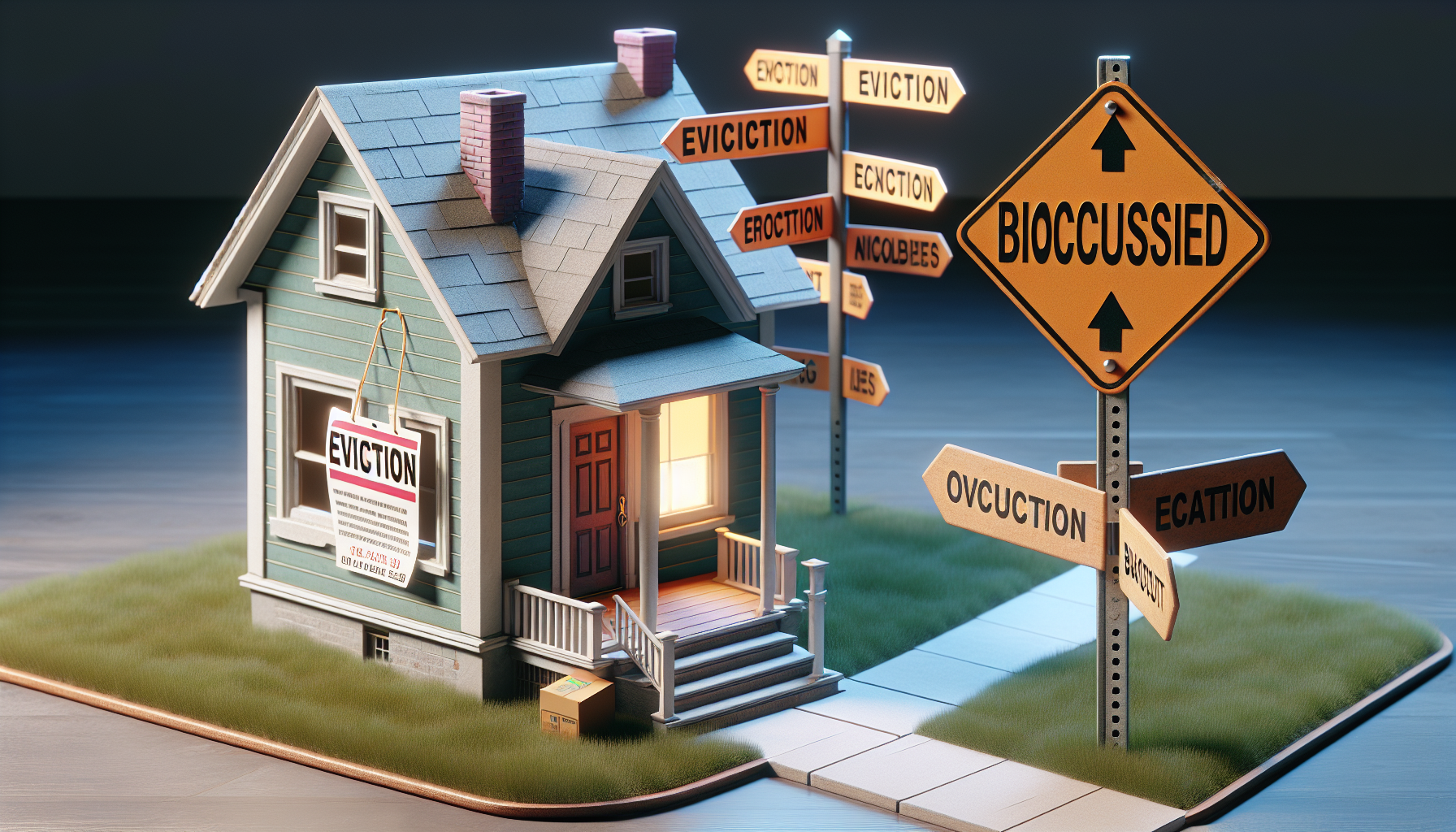
Navigating the crossroads between bankruptcy and mortgages requires a detailed understanding of insolvency and the resulting implications on home loans. This process dispels common misconceptions, such as credit counseling won’t be necessary after declaring insolvency or the myth that securing a home loan becomes impossible.
It’s integral to comprehend the legal and financial consequences ahead when dealing with bankruptcy and managing a mortgage.
As debt relief measures kick in, the immediate aftermath of personal insolvency often reveals a drastic alteration in your mortgage status.
The severity of these changes can resonate deeply with your future financing endeavors, particularly regarding home financing. Short and long-term fallout might enforce stricter borrowing terms or, in the worst-case situation, eventual repossession of your home. Once insolvency is declared, foreclosure prevention measures and credit counseling programs come into play to protect against loan defaults and repossession, offering potential avenues for debt relief.
Understanding Bankruptcy The Role of Debt Relief
Bankruptcy is a legal process involving individuals unable to meet their financial obligations, incurring considerable mortgage arrears, and providing them with a fresh start. This procedure can significantly impact housing loans, contributing to a person’s financial distress by converting potential home debts into a part of the bankruptcy process.
This situation can push homeowners into making challenging decisions concerning ‘home retention or foreclosure’.
The ‘debt consolidation’ strategy varies significantly from bankruptcy.
While there’s the ability to entirely waive off debts through bankruptcy, debt consolidation amasses them into a single manageable monthly payment.
Potential home loss can result from filing for Chapter 7 bankruptcy, which positions it starkly against Chapter
The latter operates similar to a debt relief plan, permitting debtors to retain their homes even during financial hardship. Loan modifications can function as a remarkable tool in preventing the loss of one’s home during periods of financial distress, mortgage arrears, and debt consolidation, especially when considering options like Chapter 7 or 13 bankruptcy.

Preventing Foreclosure Insolvency Solutions
For homeowners, navigating home equity and debt can be complex, especially when insolvency or foreclosure looms. A borrower unable to meet mortgage repayments may face foreclosure.
The lender then sells the property to recoup the debt, potentially leading to personal bankruptcy.
Insolvency can arise when debt surpasses the value of one’s assets.
This situation can devastate homeowners, potentially leading to the loss of hard-earned home equity. The intersection of indebtedness, home equity, and homeownership can place a home in jeopardy, particularly when creditors make claims.
When financial distress menacingly knocks on the door, strategies to prevent such distress should be mapped out. These strategies can navigate the twists and turns of debt discharge monitoring and creditor claims.
The effective management of these aspects can mitigate the risk of foreclosure. Debt restructuring, such as mortgage settlement or debt discharge, can potentially offer a lifeline to homeowners in financial crisis, protecting their home equity from creditors’ claims and saving them from personal bankruptcy.
Credit Counseling A Path to Financial Distress Relief
Dealing with financial distress, often conceived from diverse causes, can be a daunting ordeal. It significantly dents one’s capacity to meet financial commitments, plunging individuals into a sea of stress and possibly a bankrupt estate.
Yet, amidst the turbulence, credit counseling emerges as a guiding beacon, offering relief during these challenging times.
Taking the reins in dire financial situations, credit counseling plays a pivotal role, particularly for individuals grappled with a bankrupt estate.
It equips you with a strategic game plan to responsibly manage debts, thereby averting insolvency proceedings. Credit counseling serves as an educational tool, offering a semblance of control over your finances, helping to dodge the pitfalls of negative equity, and implementing a feasible mortgage payment assistance plan.
The complexity of homeownership often exacerbates financial distress. The looming risk of losing one’s cherished abode to a bankruptcy trustee drives numerous individuals to seek mortgage payment assistance, refinance their mortgage, or explore other options for managing negative equity in the midst of insolvency proceedings and the complex process of handling a bankrupt estate.
Navigating Loan Defaults and Repossession
The journey to understanding loan defaults and their implications can be daunting for most, yet it serves as a vital phase towards financial recovery. One of the options that could potentially help consumers manage such troublesome debt is a consumer proposal.
This approach involves making an agreement with your creditors, enabling partial repayment schemes.
Failure to adhere to these conditions can lead to escalating repercussions like home repossessions.
Home repossession signifies a seizure of your property due to unpaid mortgage loans, which can occur if you’re unable to meet the terms of your consumer proposal, or other debt repayment plans. Nevertheless, amid such trying times, adopting techniques such as mortgage forbearance could provide relief.
The concept of mortgage forbearance offers a temporary solution by pausing or reducing your mortgage payments. It’s designed to aid struggling borrowers, helping them maintain their homes while navigating financial hardship. Yet, as we navigate through consumer proposals, mortgage forbearance, debt settlements, credit scores, reaffirmation agreements, and home repossessions, it’s imperative to understand the impact of each on our financial stability.
Key Points on Debt Management and Financial Stability
- A consumer proposal is an agreement with creditors for partial repayment of debt.
- Failure to meet the terms of a consumer proposal can result in severe consequences like home repossession.
- Mortgage forbearance provides temporary relief by pausing or reducing mortgage payments, aiding borrowers in financial hardship.
- Understanding the impact of consumer proposals, mortgage forbearance, and other debt management tools is crucial for financial stability.
Managing Mortgage Arrears Debt Consolidation
Understanding how to manage mortgage arrears is essential due to its complexities, including the handling of secured debt. These arrears, a form of secured debt, arise when homeowners are incapable of making timely mortgage payments.
Such financial hardship can trigger severe consequences, notably asset liquidation.
Homeownership can face significant challenges during periods of financial distress.
Accumulated unsecured debt, particularly credit card debt, can overstress personal finances, escalating the risk of failing to maintain home loan payments. This financial strain can lead to severe repercussions, potentially culminating in the loss of the home.
Implementing a strategy such as debt consolidation can support the management of crippling debt. This debt management technique involves unifying various debts into one with lower interest – typically a home equity loan.
This can simplify the process of making mortgage repayments and provide a more effective way to handle debts
Loan Modifications A Solution to Bankruptcy
In the midst of the prevailing financial chaos, several homeowners teeter precariously close to insolvency. The fearful shadow of a foreclosure auction frequently hovers, intensifying preforeclosure alarms.
While bankruptcy provides a legal escape, its association with the risk of losing home ownership makes it less desirable, specifically for dwellers with a subprime mortgage or a second mortgage.
Bankruptcy could potentially shatter the dream of retaining home ownership post-insolvency.
An alternative path, however, emerges with loan modifications. This proactive solution enables homeowners to adjust the terms of their mortgage.
Consequently, it circumvents the devastating possibilities like a deed in lieu of foreclosure or initiating a short sale.
The benefits of loan modifications are manifold.
They offer an avenue to decrease monthly payments, lower interest rates, and sometimes, even prolong the loan term. With these advantages, loan modifications dramatically diminish the risk of foreclosure auction, preforeclosure, and deed in lieu of foreclosure, lessen the need for a short sale or second mortgage, and mitigate the burden of subprime mortgage.
| Financial Situation | Impact | Solution |
|---|---|---|
| Homeowners close to insolvency | Risk of foreclosure and loss of home ownership | Loan modifications as an alternative to bankruptcy |
| Subprime or second mortgage holders | Increased burden and risk of losing home | Loan modifications to adjust mortgage terms |
| Financial chaos and preforeclosure fears | Possibility of deed in lieu of foreclosure or short sale | Loan modifications to decrease payments, lower interest rates, and prolong loan term |
Personal Bankruptcy vs Mortgage Settlement Whats Best
Making a choice between filing for personal bankruptcy and pursuing a mortgage settlement can be a massive stride in your financial journey. The grim shadow of mortgage delinquency may lead you towards these alternatives with hopes to avoid the foreclosure process.
Personal bankruptcy is a legal process invoked when a person is unable to pay back their debts, making it a potential option for serious debt management.
It does come with risks like equity stripping, a practice wherein one’s home equity is excessively reduced or wiped out entirely.
A bankruptcy filing could come at the cost of your home in a trustee sale to pay off creditors, or worse, lead to allegations of bankruptcy fraud if not handled properly.
Conversely, opting for a mortgage settlement enables you to renegotiate your loan terms with your lender.
This approach can be particularly beneficial when faced with the challenges that come with mortgage delinquency
How Creditors Claims Affect Your Mortgage
Amidst a financial crisis, the stability of your mortgage can be put under strain. Voluntary bankruptcy could become an attractive option when creditors’ claims start to pile up, impacting your home loan status significantly.
Although a first claim could lead to some form of debt forgiveness, subsequent claims can be more troublesome and challenging to navigate.
A creditors meeting often unfolds the plot of these challenging situations, with negotiations playing a critical role in determining your home loan’s faith under insolvency.
On one hand, some may consider the route of involuntary bankruptcy, but this choice can lead to a severe degradation of your credit health.
Elevating your credit status post such a financial crisis becomes essential.
Credit repair is not an overnight miracle; it’s a slow and steady process that calls for a meticulously planned strategy. It’s about putting the broken pieces back together and reinventing your financial stability through measures like voluntary bankruptcy, involuntary bankruptcy, debt forgiveness, credit repair, attending creditors’ meetings, and confronting the financial crisis head-on.
| Financial Crisis Impact | Recovery Measures |
|---|---|
| Strain on Mortgage Stability | Voluntary Bankruptcy |
| Creditors’ Claims Impacting Home Loan Status | Debt Forgiveness |
| Degradation of Credit Health | Credit Repair |
| Challenging Creditors’ Meetings | Confronting the Financial Crisis Head-On |

Get a Free Bankruptcy Case Evaluation